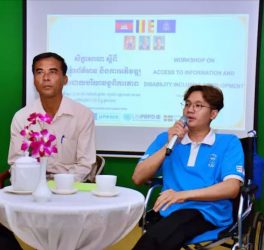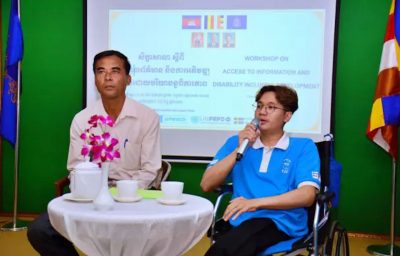
A women’s health document published in Braille enables women with vision disabilities to access sexual health information.
Nearly 150 copies of the 23-page booklet, entitled “A matter of importance: your reproductive health and reproductive rights,” also available in digital form in Kazakh and Russian, were sent to 34 specialized libraries and boarding schools for the visually impaired.
Saltanat Tleukenova is a librarian at the Republican Library for People with Visual Impairments. “There is always demand for this type of information,” she said. “Due to the lockdown we allocate two hours per every reader. We already have people queueing to read the book. Even I found a lot of useful information in the publication for myself.”
“People with disabilities face a number of challenges concerning their reproductive health and reproductive rights,” said UNFPA Representative for Kazakhstan and Country Director for Kyrgyzstan and Turkmenistan Giulia Vallese. “While the focus is often on physical obstacles, there are many other types of limitations which are often overlooked and relate to lack of information that can hinder their quality of life. The materials we have prepared are designed to empower people with disabilities to live fulfilling lives and exercise the right to motherhood and family planning.”
There were 293,511 women with disabilities living in Kazakhstan, as of the first half of 2018, according to a 2019 report. Of these, only half a percent, or 1,467, become mothers – a rate not always associated with health reasons. Stigma and discrimination not only discourages women from having children but prevents them from accessing essential care. They also lack access to information. The rate of unmet family planning among women with disabilities was 41.5 percent, four times higher than the total population. And less than half who require annual screenings for breast and cervical cancer receive them.
“The most important question is that we must be accepted and perceived as rights-holders, regardless of whether there is a disability or not,” said Lyazzat Kaltayeva, chairperson of the Shyrak Association of Women with Disabilities, which developed the Braille publication with UNFPA and financial support from the UK government. “Every woman, despite her disability, has the right to decide whether to have a child, how many children to have, and how often.”
In the future, booklets will be created to address other disabilities, including mental health and psychological disabilities.
“With the pandemic exacerbating gender inequalities, gender discrimination and gender-based violence, addressing the needs of women and girls with disability is an urgent requirement,” said British Ambassador to Kazakhstan Mike Gifford. “These women are particularly vulnerable as they may face a ‘double discrimination’ because of their gender as well as their disability. Informing women and girls with disabilities about their reproductive health and rights is a small but important step towards empowering them about their wider life choices.”
Born with a visual impairment, Olga Lonshakova, 25, teaches at a local special school for children with similar challenges. “There is quite a gap with information about reproductive health and rights. I used to get some information on audio discs,” she said. “However, for people who have both speech and visual impairments, Braille books are really the only window into the outside world.”








